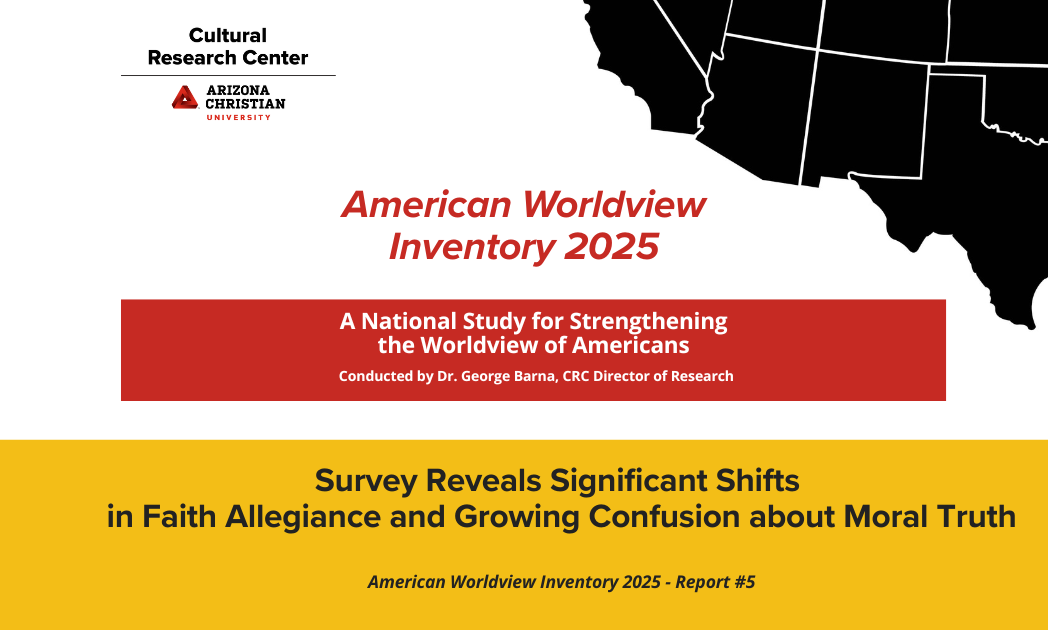From the Cultural Research Center at Arizona Christian University
GLENDALE, AZ —A new report from the Cultural Research Center at Arizona Christian University reveals a dramatic shift in America’s spiritual landscape, with a significant decline in Christian affiliation, a rise in non-Christian faiths and “no-faith” segments, and widespread confusion about moral truth.
The latest report from the American Worldview Inventory 2025 by Dr. George Barna found that the percentage of Americans identifying as Christians fell from 72% in 2020 to 66% in 2025—a loss of about 15 million adults. At same time, non-Christian faiths are seeing dramatic increases: Buddhism has grown by 56%, Judaism by 21%, and Islam by 12%. In total, non-Christian faiths have expanded by 39% since the start of the decade.
The report also shows that the segment of Americans claiming no faith has risen from 20% to nearly 23%, totaling approximately 60 million adults. For the first time this group now outnumbers Catholics, traditionally the largest single religious group in the country.
According to Barna, CRC director of research and author of the study, “Christianity is slowly shrinking to the benefit of competing faith systems. While some non-Christian faiths remain relatively small, the direction of change is unmistakable and deeply consequential.”
One of the most significant outcomes of this spiritual shift is the growing national rejection of absolute moral truth—a foundation long associated with the biblical worldview. The research found that 66% of American adults reject or doubt the existence of absolute moral truth. Instead, most Americans determine right and wrong based on personal feelings, circumstances, or public opinion.
This trend extends across religious boundaries. Among non-Christian faith adherents, 67% deny absolute truth. Among those with no faith, the figure is 77%, up from 68% in 2020. Even among mainline Protestants and Catholics, rejection of absolute truth stands at 61% and 69%, respectively.
Notably, the report found that only one segment saw meaningful improvement: theologically-defined born-again Christians, among whom rejection of absolute truth declined from 57% to 49%.
According to Barna, the wide and seemingly inconsistent range of responses regarding how people discern moral truth suggests that many adults lack any strict boundaries in such determinations.
“Two out of three adults believe truth is conditional, and more than four out of five Americans are comfortable drawing from multiple sources or bases of truth,” Barna explained. “Even people who generally believe the Bible or the God of the Bible are the most reliable sources of moral truth admit that it is common for them to make their moral choices based on feelings, laws, traditions, peer pressure, social standards, science, or ease.”
Barna attributes much of the social instability and turbulence Americans admit to feeling to the public’s confusion over how to ascertain truth. “There is little predictability to the moral choices people make because there is so little consensus and conversation related to the basis of truth,” the veteran researcher explained.
“With a minority of Americans believing that the God of the Bible is real and reliable, and an even smaller number reading the Bible during a typical month, it’s no wonder there is such moral turbulence in our culture,” Barna continued. “Everyone becomes his or her own arbiter of truth, and without absolutes, there is little sense that there is a ‘right’ answer to discover, or to have ideas about how to figure it out if there were such a definitive reality.”
Having done more nationwide research on America’s worldview than anyone, Barna asserted that the philosophical and spiritual chaos in America today is the result of rejecting moral absolutes, the unfortunate reliance on feelings as the ultimate determination of truth, and a widespread acceptance of unreliable or misleading sources of wisdom regarding morality.
“As sad as this state of affairs may be,” Barna commented, “it is predictable and understandable. The dominant worldview in America is Syncretism, an eclectic and highly personalized mixture of the sacred and the secular, embraced by nine out of 10 adults. Possessing a worldview that thrives on relativism and the flexibility of its core beliefs certainly fosters the ‘all sources are legitimate’ route to moral decision-making.”
The report urges churches, families, and educators to recommit to teaching and modeling a biblical worldview, grounded in the unchanging truth of Scripture. One route to providing clarity about truth, Barna suggested, would be for churches, families, and schools to consistently advocate the existence of absolute moral truth based on a more comprehensive and integrated understanding of biblical truth principles.
The American Worldview Inventory 2025: A National Study for Strengthening the Worldview of Americans, is part of a multi-year research initiative designed to increase biblical worldview among Americans by identifying current beliefs, diagnosing areas of spiritual weakness, and offering practical insights for renewal.
Also designed to increase biblical worldview in America, Dr, George Barna created the ACU Worldview Assessment to evaluate how closely a person’s beliefs and behaviors reflect the biblical worldview. This 15-minute online tool evaluates worldview alignment and highlights areas for growth based on decades of research. The assessment measures core worldview categories and the foundational “Seven Cornerstones” shown to be essential for developing a biblical worldview. To learn more or take the assessment, visit www.ACUWorldview.com.
Read the full American Worldview Inventory 2025 Report 05, “Survey Reveals Significant Shifts in Faith Allegiance and Growing Confusion about Moral Truth,” and access previous reports in the series here.

